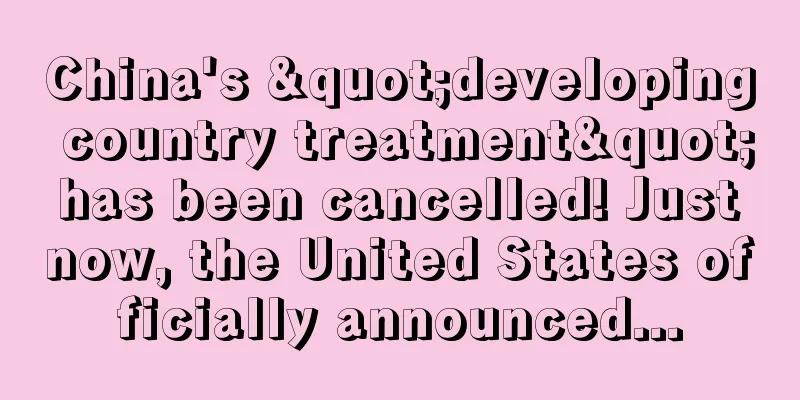China's "developing country treatment" has been cancelled! Just now, the United States officially announced...

|
The magical beginning of 2020 has caused foreign trade people to suffer from internal and external troubles! Domestically, many factories cannot start work as scheduled, which makes sellers face the risk of out-of-stock at all times, and even makes many companies face layoffs and bankruptcy! On the international front, our two most important export markets, the European Union and the United States, have undergone earth-shaking changes, which may make our future development precarious! 01 EU reaches deal with our biggest competitor to eliminate 99% of tariffs As we were fighting the epidemic with all our might at home, news first came from the European Union: an agreement had been reached with Vietnam to eliminate 99% of tariffs within 10 years! On the 12th local time, at the European Parliament headquarters in Strasbourg, France, the European Parliament officially passed the EU-Vietnam Free Trade Agreement with 401 votes in favor, 192 votes against, and 40 abstentions. Vietnam became the second Southeast Asian country to reach a free trade agreement with the EU after Singapore. After the agreement comes into effect: The EU will immediately eliminate about 85.6% of Vietnam's import tariffs, accounting for 70.3% of Vietnam's exports to the EU. On the other hand, 48.5% of the taxes on EU exports to Vietnam will be eliminated immediately, accounting for 64.5% of the EU's exports to Vietnam; 99% of the tariffs on goods between the two sides will be gradually eliminated within 10 years. The Vietnamese government predicts that by the end of 2020, the free trade agreement will promote Vietnam's exports to the EU to increase by 20%! Vietnam, as our biggest competitor in foreign trade exports, has the most direct competition with us in industries such as textiles, clothing and luggage! Once the free trade agreement is implemented, the EU will also provide Vietnam with advanced equipment and technical support to help it improve labor efficiency and product quality! These labor-intensive products in Vietnam will greatly erode the market of Chinese sellers! At that time, Chinese sellers may be forced to transform and turn their attention to products with higher technological content, and find a balance between technology and price, so that they can have new development opportunities in the European market!
02 Will Vietnam shake China's position? We all know that China's coastal areas used to be notorious "sweatshops". Due to the globalization of the world economy, foreign capital was attracted by China's cheap labor. At the same time, with China's reform and opening up, a large number of foreign capital was attracted to China to invest and build factories. In recent years, China has been adjusting its industrial layout. Coupled with the continuous increase in China's labor costs, many foreign companies such as Adidas and Nike have turned their attention to Vietnam! Vietnam's low prices and low labor costs have also become the best choice for foreign investors! However, it is difficult for Vietnam to fundamentally shake China's position! In terms of market share and production capacity, China is in an absolute leading position in global export manufacturing, and other countries cannot significantly improve in these areas in the short term. And there are still many factors within Vietnam that limit the increase in its production capacity! First, although Vietnam is ambitious about privatizing state-owned enterprises, the actual pace is quite slow. At the same time, bureaucracy and corruption are also one of the problems in Vietnam. Finally, although Vietnam's infrastructure construction is constantly developing, it is still at a relatively backward level overall. But the above comparison is only from a macro perspective. The signing of the free trade agreement between Vietnam and the EU still has a direct impact on our foreign trade industry! 03 US: Eliminate preferential treatment for developing countries The free trade agreement between the EU and Vietnam is already difficult to digest, but the news that followed is even more shocking - the United States cancels China's preferential treatment as a developing country! According to the notification of the Office of the United States Trade Representative, the Office of the United States Trade Representative (USTR) announced that it would amend a key exemption principle in the Trade Remedy Act to cancel the preferential treatment (Special and Differential treatment) for developing countries in the World Trade Organization (WTO) enjoyed by 25 economies, including China and Hong Kong, China! This means that in the future, the "special and differential treatment" may no longer be applied in its trade with China, but will be carried out in accordance with the standards of developed countries. The full list of 25 countries and regions is: Albania, Argentina, Armenia, Brazil, Bulgaria, China , Colombia, Costa Rica, Georgia, Hong Kong, India , Indonesia, Kazakhstan, Kyrgyz Republic, Malaysia, Moldova, Montenegro, North Macedonia, Romania, Singapore, South Africa, South Korea, Thailand, Ukraine and Vietnam.
The reason why the United States enacted this policy is to lower the threshold for the United States to investigate whether other countries are harming its own industries through unfair export subsidies , thereby protecting its own companies! Second, the US government, led by Trump, has long been dissatisfied with the WTO benefits enjoyed by a large economy like China! The WTO's "special treatment" for developing countries in trade is mainly reflected in four points: 1. The degree of protection allowed is higher than that of developed countries. Specifically, the average import tariff rate can be higher than that of developed countries. Currently, the average tariff rate in developed countries is 4%, while that in developing countries is 14%. 2. Allow developing countries to continue to enjoy the unilateral tariff preferences granted by developed countries before joining the WTO, namely the Generalized System of Preferences. 3. Allow a longer transition period than developed countries. If developed countries have problems after joining the WTO, they must complete the integration with the WTO within two years, while developing countries can extend the period to four to eight years. 4. The principle of allowing some exceptions in the WTO. For example, dumping is not considered dumping if the export price of developing countries is lower than the domestic market price by a certain standard. For another example, regarding investment, developing countries can regulate the direction and proportion of foreign investment utilization according to their own economic development needs. When Trump visited Davos, Switzerland last month, he said that the WTO treated the United States unfairly. "China is considered a developing country, India is considered a developing country, but we are not considered a developing country. As far as I am concerned, we are also a developing country." It can be seen that Trump is very resentful!
04 Will foreign trade exports be affected? The Office of the United States Trade Representative said it was necessary to revise the methodology for anti-subsidy investigations into developing countries because the previous U.S. guidelines, which dated back to 1998, were "outdated." What kind of obstacles will this create for foreign trade exports for these 25 countries and regions, especially China, if they are deprived of their “developing country treatment”? When the developing country treatment is cancelled, the United States will be able to more easily issue fines to companies from China, India and other countries for illegal activities. Maybe we will face the same situation as Huawei in the United States, but not every company has the strength of Huawei! Especially for Chinese small and medium-sized enterprises that are attached to Amazon, they have no strength to support extreme policies for a long time! Personally, I guess that for cross-border e-commerce sellers, taxation and intellectual property rights may be the main factors that hinder our future development in the United States! Sun Xiangyang, co-chair of the World Customs Organization's Cross-Border E-Commerce Working Group, also said: The United States' cancellation of China's developing country status will increase Chinese companies' trade costs with the United States and make domestic sales competition more intense! Under WTO rules, a government must terminate its countervailing duty investigation if the amount of a foreign subsidy is minimal (usually defined as less than 1% ad valorem). But WTO rules provide a different standard for so-called developing countries, requiring investigators to terminate tariff investigations if the amount of subsidies is less than 2%. Therefore, the United States' action to stop preferential treatment for China's developing countries will trigger an increase in the costs of Chinese companies' trade with the United States! — END — At this moment, I can't help but think of an old Chinese saying, "When you are sick, we will kill you!" When China was facing the epidemic, the United States and Vietnam, our largest export rival, began to take action! However, I don’t think anyone thinks this will kill China! With each step of the “Made in China” plan being implemented and the continuous improvement of China’s intellectual property system, China and Chinese sellers will surely step onto another level! At that time, when the opponent is no longer an opponent, everything will be solved! There is still a long way to go, let’s work hard! (Source: Cross-border Knowledge) |
>>: Sellers are losing money! FBA's new policy allows buyers to exchange goods for free at will!
Recommend
Another wave of store closures?! Amazon is secretly taking action
Last time I told you that the European Union has ...
Blocked sellers collectively sued Amazon! Can the frozen funds be recovered?
▲ Video account focuses on cross-border navigation...
Scandal-ridden, brother-in-law is ruthless this time! Five-star reviews are dangerous...
Recently, Amazon has been reported by major forei...
What should I do if the Amazon FBA inventory shows the Reserved status?
Amazon's Prime delivery provides consumers wit...
What is Coupang? Coupang Review
Coupang is a South Korean e-commerce company and t...
What is Anhui Newska Intellectual Property Agency Co., Ltd.? Anhui Newska Intellectual Property Agency Co., Ltd. Review
Anhui Newska Intellectual Property Agency Co., Ltd...
What is Yao Changjie? Yao Changjie Review
Yao Changjie, born in 1964, graduated from Shaanxi...
What is FBA Wizard? FBA Wizard Review
FBA Wizard is an Amazon tool that helps sellers re...
Platform downtime, Silicon Valley Bank shock, Shopify sellers have a hard week
It is learned that on March 13, the Shopify platfo...
What is the German New Packaging Law (VerpackG)? German New Packaging Law (VerpackG) Review
VerpackG is a new packaging law to be implemented ...
What is Tweepsmap? Tweepsmap Review
Tweepsmap is an application that collects the loca...
What is StyleLend? StyleLend Review
StyleLend is an American clothing rental platform....
American college students love to shop on Amazon! These are the categories they often buy
It is learned that according to foreign media repo...
Laughter and tears | Click to receive the 2020 exclusive annual report of Cross-border People
Write at the beginning Recently, the annual repor...
Google officially opens Bard public beta, starting with the UK and the US
It is learned that on March 21, Google announced t...









